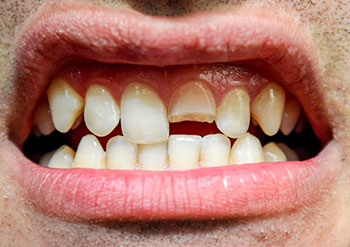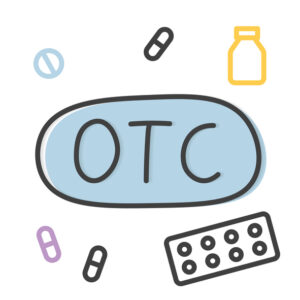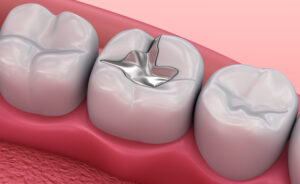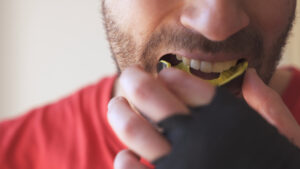A chipped tooth is a common dental issue that can happen for a variety of reasons, including:
- Biting on hard foods
- Uneven chewing
- Trauma/injury
- Using teeth as tools
- Grinding/clenching teeth
- Tooth decay
If you leave a chipped tooth untreated, you increase your risk of more serious oral and overall health conditions. If you have a chipped tooth, schedule an appointment right away for treatment. If you are experiencing pain, swelling, and/or bleeding, an emergency appointment may be appropriate.
Symptoms and Signs of a Chipped Tooth

-
Pain
In some cases, a chipped tooth may cause pain. If the pain is uncontrollable, you should seek treatment right away.
-
Sensitivity
Some patients experience sensitivity when consuming hot or cold foods/beverages after chipping a tooth.
-
Visible Damage
The most obvious sign of a chipped tooth is the visible damage.
Types of Chipped Teeth
There are several different types of chipped teeth, including minor, moderate, severe, and cracked. All types of chipped teeth should be treated quickly, but the type of chip determines the method of treatment.
Treatment Options for a Chipped Tooth
When you have a chipped tooth, there are several options to choose from:
-
Dental Bonding
Dental bonding is a procedure involving the application of tooth-colored composite resin to the affected tooth to restore its appearance.
-
Dental Veneers
A dental veneer is a thin tooth-colored shell placed on a front tooth to restore its appearance.
-
Dental Crowns
A dental crown, or cap, is used to cover a tooth that is severely damaged or decayed to salvage the structure of the tooth, as well as restore its functionality and appearance.
-
Root Canal Treatment
Root canal treatment is needed when an infection has gotten into the soft center, or pulp, of the tooth. A tooth that has been treated with root canal therapy is typically covered with a dental crown to protect it.
-
Tooth Extraction
Extraction is only recommended when all other options have been exhausted. This involves the removal of the tooth either by pulling it or surgically removing it.
Home Remedies for a Chipped Tooth
If you have a chipped tooth, you should see a dentist right away for treatment. However, there are some things you can do at home while you are waiting for an appointment.
Over-the-Counter Pain Relief
If you have pain with your chipped tooth, OTC pain relievers can help. If you have severe pain, you should seek emergency treatment.
Saltwater Rinse
A saltwater rinse can help prevent bacteria buildup and ease any pain that you might be feeling.
Cold Compress
A cold compress can help with swelling and pain while you wait.
Temporary Filling
You can find OTC dental wax kits that you can use to temporarily restore the tooth while you are waiting for treatment.
Soft Foods
While it might hurt to eat, it’s important to make sure that you get the nutrition that you need. Therefore, a liquid or soft food diet is recommended. This includes smoothies/protein shakes, pudding, applesauce, chicken, ground beef, potatoes, and other foods that are easy to chew.
Prevention of Chipped Teeth
There are a few things that you can do to prevent chipped teeth, such as:
Wearing a Mouthguard
Trauma/injury can easily cause teeth to be cracked or chipped. If you experience trauma to the face or mouth, schedule an emergency dental appointment. This will allow the dentist to determine if there was any damage done and what actions are needed.
Avoiding Hard Foods
One of the most common causes of dental damage is hard, crunchy foods. You can reduce your risk of chipped teeth by avoiding these foods.
Proper Oral Hygiene
Proper oral hygiene involves brushing twice daily and flossing at least once. You can also use an alcohol-free mouthwash. These habits will prevent bacteria and plaque buildup, which will reduce your risk of chipped teeth.
Regular Dental Checkups
According to the American Dental Association, you should be visiting the dentist every 6 months for an exam and dental cleaning. While this will not 100% prevent chipped teeth, it will keep your mouth and teeth healthy and reduce your risk.
What to Expect During a Dental Visit for a Chipped Tooth
A chipped tooth is considered an emergency. When you visit the dentist for a chipped tooth, there are a few things that you can expect:
-
Evaluation and Diagnosis
If you have any pain, bleeding, and/or swelling, the first step will be to get those symptoms under control. Once we do that, we can evaluate your condition and determine the cause and severity of your chipped tooth.
-
Treatment Options
Once we determine the cause of your chipped tooth, we can go over your treatment options, which include:
- Dental bonding
- Dental veneers
- Dental crowns
- Root canal treatment
- Tooth extraction
-
Recovery and Aftercare
Recovery and aftercare actions depend on the type of treatment used. The dentist will go over the specifics with you prior to performing the procedure.
Cost of Treating a Chipped Tooth
-
What Factors Impact the Cost of Treatment
There are several factors that impact the cost of treatment, including:
- Type of treatment
- Materials used
- Location of dental clinic
- Location of the tooth being treated
- Experience/expertise of the dentist
-
Types of Dental Insurance Coverage
There are several different types of dental insurance coverage, including:
- Preferred Provider Organizations
- Dental Health Maintenance Organizations/Capitation Plan
- Indemnity Plans
- Direct Reimbursements
- Point-of-Service Plans
- Discount/Referral Plans
- Exclusive Provider Organizations
- Table/Schedule of Allowance Plans
-
Out-of-Pocket Expenses
Most dental insurance providers will not cover cosmetic procedures. Therefore, if your chipped tooth treatment is considered cosmetic, you will have to pay 100% of the cost out-of-pocket.
If a procedure is covered, you will usually be required to pay a co-pay, and depending on the procedure and your coverage options, you may have to pay a deductible before the provider picks up the remainder of the bill.
Frequently Asked Questions
If you have any questions or concerns about chipped teeth, please contact Arlington Dental Excellence and let us know. We will be happy to address those at any time. Below are some of the most common questions that we hear about this dental issue.
-
Can a chipped tooth heal on its own?
No, a chipped tooth will not heal on its own. You will need treatment to prevent the problem from escalating.
-
Is a chipped tooth an emergency?
A chipped tooth may be an emergency, depending on your other symptoms. If you are having uncontrollable bleeding, pain, and/or swelling, you should seek emergency dental treatment right away. If the issue is only cosmetic, you may be able to schedule a standard dental visit.
-
How long does it take to treat a chipped tooth?
The time it takes to treat a chipped tooth depends on the treatment used. In most cases, the procedure can be completed in 1 to 2 appointments. However, you may require a third one if the tooth is especially complex.
-
Can a chipped tooth cause health problems?
Yes, there is a risk that a chipped tooth can develop an abscess and become a major health issue. Therefore, it is important to seek treatment as soon as possible.
-
Can a chipped tooth affect speech?
A chipped tooth generally does not impact speech unless it breaks off or falls out.
Conclusion
If you have a chipped tooth, prompt treatment is critical. If left untreated, the affected tooth may become infected, which can lead to many serious oral and overall health issues. Schedule your evaluation today to learn more about your treatment options.













